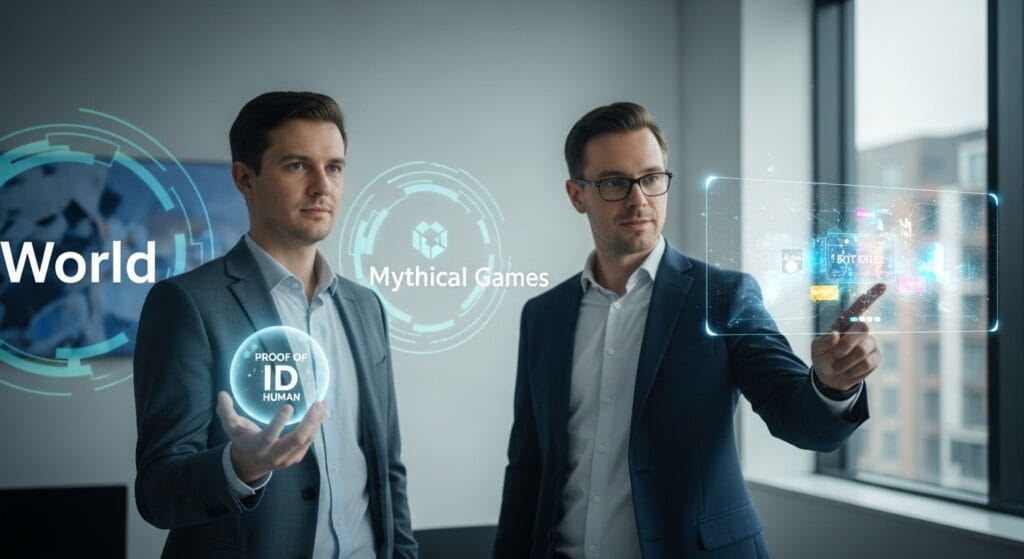The digital playgrounds of our time, where pixels meet passion, face a quiet invasion. Bots, those tireless automatons, have been slipping into games. They snatch rewards, twist economies, and generally make things less fun for actual human players. It is a problem that has been growing for years.
- Web3 gaming companies World and Mythical Games are partnering to combat bots in online games, aiming to restore fair play and enhance player experience.
- World’s “proof of human” ID technology, utilizing an in-person eyeball scan, verifies users and has already attracted over 17 million participants, with support from figures like OpenAI CEO Sam Altman.
- Mythical Games will integrate this technology into its titles, protecting in-game economies and player asset value, while also launching its MYTHOS chain on the World network as the first Layer 3 blockchain.
Now, two significant names in web3 gaming, World and Mythical Games, are joining forces. Their mission is clear: to tell the difference between a human player and a piece of code. This partnership aims to bring back fair play to titles like “NFL Rivals,” “FIFA Rivals,” and the “Pudgy Party” game.
Think about it. You are deep into a game, strategizing, building, competing. Then you realize half the competition is not even human. They are scripts, designed to grind endlessly, scoop up rare items, or manipulate markets. It takes the joy right out of the experience, does it not?
The companies themselves pointed this out in their statement. They noted that bots, while sometimes useful, often gain unfair advantages. They can also mess with in-game economies. This means human players miss out on rewards they earned.
A study from World in April backed this up. It found that nearly 75% of gamers feel these “uninvited players” are making games less enjoyable. That is a huge number. It shows a real hunger for a solution.
World’s answer to this problem is its “proof of human” ID technology. It is a system designed to verify that you are, in fact, a person. To get a World ID, users undergo an in-person eyeball scan. It sounds a bit like science fiction, but it is happening.
Those who complete the scan and sign up receive World’s native WLD tokens as a reward. This incentive has proven quite effective. The project has already signed up more than 17 million users. That is a lot of eyeballs, and a lot of verified humans.
The project also has some serious backing. OpenAI CEO Sam Altman is among its supporters. This kind of endorsement lends weight to World’s vision for digital identity. It suggests a future where proving your humanity online becomes more common.
Mythical Games brings its own impressive roster to the table. Millions of players already enjoy their titles. These games are not just fun. They also let players truly own and trade their in-game assets. This is a core promise of web3 gaming.
But what good is ownership if bots can devalue your assets or steal opportunities? By bringing World’s “proof of human” into the mix, Mythical aims to keep those economies fair. It also makes them transparent. This protects the value for real players.
The integration goes deeper than just identity checks. Mythical will also launch its MYTHOS chain on the World network. This makes MYTHOS the first Layer 3 blockchain to build on World Chain.
For those unfamiliar, a Layer 3 blockchain often builds on top of a Layer 2, which in turn builds on a Layer 1 (like Ethereum). Think of it like building a specialized express lane (Layer 3) on a major highway (Layer 2) that connects to the main road network (Layer 1). It allows for more specific functions and efficiency.
This move suggests a future where specialized gaming blockchains can operate with the security and identity verification of a broader network. It is a smart play. It keeps the gaming experience focused while offloading the heavy lifting of identity to World.
The idea of a “proof of human” ID might feel a little strange at first. We are used to passwords and two-factor authentication. But as digital interactions grow, so does the need for stronger identity verification. Especially when real value is at stake, like in game economies.
Consider the broader implications. If gaming can successfully implement this, what other areas might follow? Online voting, social media, or even financial services could benefit. The ability to confirm a real person is on the other side of the screen holds immense power.
For now, the focus is on gaming. Mythical’s players will soon experience a cleaner, fairer environment. The frustration of competing against tireless bots might just become a memory. That would be a welcome change for many.
The partnership shows a growing trend. Web3 projects are looking for practical solutions to real-world problems. Bots in gaming are a clear pain point. This collaboration offers a concrete way to address it.
It will be interesting to watch how this unfolds. Will other gaming platforms adopt similar systems? Will the eyeball scan become a standard for proving humanity online? The digital world keeps finding new ways to ask, “Are you real?”

